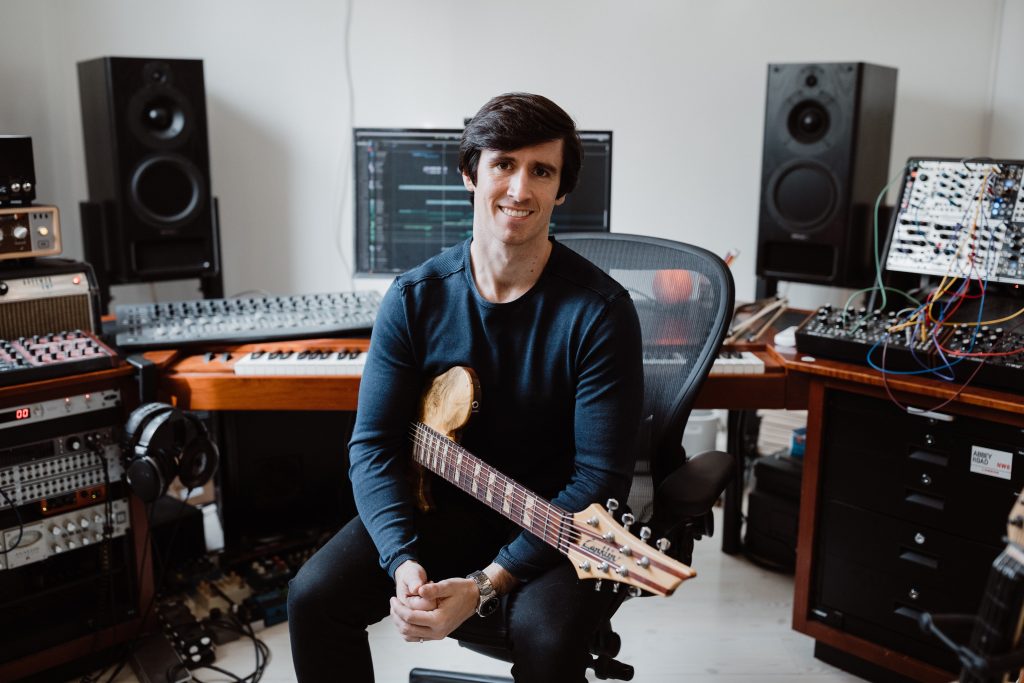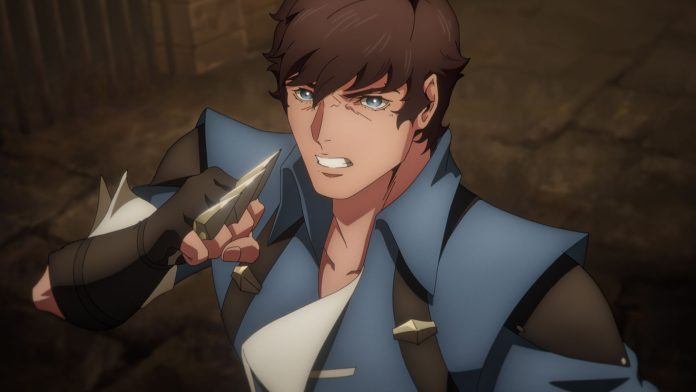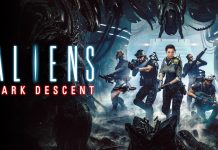Cinelinx’s resident musicologist recently sat down to talk with composer Trey Toy about his work on the new Netflix series Castlevania: Nocturne.
Earlier this month I had the opportunity to speak with composer Trey Toy about his work on Castlevania: Nocturne, a spin-off of the animated Castlevania series set during the French Revolution. Trey Toy is a Los Angeles-based composer, producer, guitarist and electronic musician. He is known primarily for his work in film, television and video games and has contributed music to a wide range of projects, from Emmy Award-winning shows such as Ozark (Netflix) and Vikings (History Channel) to Blizzard Entertainment’s hit game, Diablo IV.

I hope you enjoy our conversation about Castlevania: Nocturne.
……………………………………………………
Did you work on the original animated Castlevania? Or was this your first entry into the series?
I worked with Trevor [Morris] on the original. I co-produced the score with him and wrote additional music. So I have been a part of the Castlevania animated world since early 2017. It’s near and dear to my heart.
Were you familiar with the Castlevania games before working on the series? Because I know Nocturne and the whole series is based on them.
Yes, yes. I played the games as a kid. And it was fun working on the original. I kind of rediscovered them. I played a lot of games as a kid, but I stopped in high school, early college. So it was really fun to dive back in and do some quote unquote, research for the original. I’m actually playing Symphony of the Night right now, which is probably my favorite of all the Castlevania games.
Speaking of Symphony of the Night. I know Castlevania Nocturne is based on Rondo of Blood and that game. Does this use any themes that specifically come from either of those games?
So we used Divine Bloodlines in the trailer for Castlevania: Nocturne and Divine Bloodlines, if my memory serves me correctly, comes from Rondo of Blood and is kind of Richter’s theme. Richter is the main character of Castlevania: Nocturne. He’s the descendant of Trevor Belmont and Sypha from the original Castlevania series. And so we use Divine Bloodlines for the trailer.
Beyond that, I don’t want to spoil anything, because I know the fans get really excited about the game music. But it’s been a long time since we’ve been able to help Trevor with a cover of bloody tears for the original Castlevania, and that was the only chance we had to work with the original game themes. So it’s been a long time. And it was it was exciting to kind of dive back into that world.
When Castlevania: Nocturne came up, was there any kind of sound they specifically wanted for this series? Since it’s set three to four hundred years after the original?
Yes, exactly. Netflix and the production team definitely wanted the score to sound the same. We tried our best to stay true to to it in certain moments, but we really wanted to feel like a new evolution of the series. There is some instrumentation to signify the area we use. We use a little more harpsichord, Viola de Gamba, who’s played by the amazing Ari Mason, she’s also a vocalist, her vocals are heard all over the show, and she plays viola da gamba and she knows the instrument from a historical perspective and has studied it and is really amazing.
But in addition, we didn’t let the time period constrain us fully. We were happy to include instruments that were more anachronistic and esoteric in the score itself. The score itself while it’s inspired by the revolutionary zeitgeist of the time, it’s not necessarily a true to life, imagining of an 18th century music.
When you say anachronistic things, can you give any examples without giving anything away?
We try to stay true to Castlevania. There’s electric guitar all over the place and the action sequences and if my music history serves me, I don’t think there was electric guitar during the French Revolution.
How much harpsichord is used in the score? Because I know that was a a huge thing in the 18th century, which is when the story is set.
We used a good amount. It’s definitely peppered in throughout and it’s specifically used for the themes of one of the main villains. We wanted her to sound both refined and aristocratic, but at the same time, ancient and evil, and so it was, and so we settled on harpsichord, in addition to some other instruments for her.
It’d be hard to use harpsichord to make a character sound evil.
Yes, the harpsichord was to kind of symbolize her more elegant and aristocratic side and then we used the vocals and a bowed banjo, which sounds horrific I learned to get her some of the darker, evil quality.
I know we’ve mentioned a little bit that Nocturne uses more natural, quote unquote instruments than the original Castlevania. I confess I really haven’t seen much of Castlevania, but I’ve heard it’s more of a synthetic sound.
To be fair, there’s still synths in this score [for Castlevania: Nocturne]. I work a lot with modular synthesizers, and use them to create crazy sounds. Some of them sound electronic, some of them sound like they could come from an ancient beast, honestly. But yes, we did record more live musicians for this. Part of it was our own desire to move the series in a new direction. Part of it was the vision of Netflix and the production team.
They really wanted the music to take the forefront in a way that it hadn’t in the past and to really be a primary element of the storytelling. And we thought having some really amazing soloists on the score would make it really special. I’d say the score is a bit more thematic than the original. There is a theme for each character. And there there are soundworlds that symbolizes where each character come from, and we use different instruments to help us do that.
I would say it has the classic Castlevania epic action. And we use our fair share of orchestra drums and choir and all of that. But at the same time, it’s a very elegant and character driven story and I find the backstories for the characters very rich in detail. And having these more intimate soloist recordings really was a really nice balance against the giant epic scope of the world and the intensity of the action sequences.
So it was decided pretty much from the start that this would be a different sound for different stories.
Yes.
You mentioned each of the characters has their own theme. Is Richter’s theme connected in any way back to the original Castlevania? Is there a Belmont theme that’s invoked?
Yeah. So there is a Belmont family theme from the original [Castlevania series]. And I don’t want to spoil anything. But I will say that there is a new theme for Richter, and it very much calls back to the Belmont Family theme. It’s very much inspired by [it], but I’d say it has a little more of a youthful vigor to it. Trevor’s a bit older and disillusioned with the world. And Richter has a more youthful spot to him. And so I think his theme reflects that. And we tried to as much as possible blend elements from Sypha and Trevor and the score in Richter’s theme. So Trevor’s sound was a bit more natural, a bit more orchestral.
I’m not sure if you can actually answer this one without spoiling anything, but I’ve heard there’s an opera singer character that sings throughout. Do they perform pieces from actual operas, or were they specifically composed for the show?
So I can use the example of the piece that was in the teaser trailer from July, which is a classical piece from Monteverdi. Omar is the name of the character and he performs pieces from classical literature. But at the same time, I worked with him to produce various arrangements of these pieces. And that was a really special treat, and actually got us involved in the process very early. We started two years ago now, I believe, working with him.
It was a lot of fun. He’s an amazing vocalist, he was in the original cast of Hamilton, the actor, and it was really special getting a chance to work with him and produce some of these pieces. And I think it also adds an element that really grounds it in the time period, having these works from the classical repertoire as a part of the sound
Was it hard to choose which pieces to include or was that his job and not yours?
Actually they were in the script. So it was the writer, the writers and showrunners. It was the pieces that were selected, were very much connected to the story. And so they were in the script from the very beginning.
How long were you working on Castlevania: Nocturne? Where were they when you came in?
So it was about two years ago. And we started basically from the scripts, which was really cool. We don’t always get a chance to do that. So we started working with Sidney on the opera pieces, based purely on the scripts. We got to hear the audio recording of the voice actors, we got to see animatics as they were updated, and then all the way until the final locked cut. I’d say we spent maybe 12 to 15 months with the material before we started actually scoring the picture.
Isn’t it unusual to have so long on a project?
Yes. I mean, the actual scoring process was a bit more of a typical length, we started scoring it towards the end of last year, and we finished in June. But the production of the opera pieces started earlier.
When you were putting the music together, was it written episode by episode? Or was it more conceived of as one big piece?
The narrative arc is such that you can think of it all as one piece, but at the same time, each episode explored various characters in new ways. So each episode gave us an opportunity to delve into something new. So it’s a bit of both, we had to keep the whole story and the whole scope in mind as we crafted the score. And there’s very much an art to the entire thing. But each episode had a special element that made it unique. And that was really fun. That kept it from becoming monotonous.
How did working on Castlevania: Nocturne compared to other projects you’ve worked on?
The amount of time that we were involved was really cool. It’s great to get to spend that much time talking to the show runners and directors. And when you get a chance to read the scripts from an early period, you get a sense of where the story is going in a special way. It’s really great to just read the character direction, read the scene description, read the character backstories that really gets you in the headspace of the writer, which is very cool.
And it’s not something you always get a chance to do at the same time. And also, in addition to that, having the embedded fan base for Castlevania, we were constantly aware that people love these games, they love the music from the games. And so there’s a lot of pressure that I feel to deliver to the fans and make sure that they love everything about it. Every score, we try to do our best, obviously, but when you know that people are going into it listening for the music, and wanting something special, it’s inspiring, it helps us bring it to the next level.
Do you think it was a good thing, having that kind of pressure hanging over your head? Because, I mean, some can argue a passionate fan base can be a double edged sword.
Sure, yeah. No, that’s a great point. I mean, at the end of the day, this show is an evolution of the franchise. It’s an evolution of the series. We wanted Nocturne to stand on its own as a unique story. And so we weren’t afraid to try new things with the score and be bold. At the same time, knowing that there are people who care that much, and who really care about the score, I think is ultimately a positive thing. And I think it’s ultimately something that drove us to make it as great as it possibly could be.
When the show arrives on Netflix, is there any anything you hope stands out to the audience?
I mean, in the in the broadest sense, I hope that people can see the passion of all of the creators for the show, from the character design, to the writing, to the animation, to the sound to the music, it’s very clear that everybody involved is working to make sure that the characters and the games truly come to life in a special way. And, and I think I’m very confident that fans of the games will be will be pleased and satisfied with with the finished product.
…………………………………
I would like to thank Trey Toy for taking the time to speak with me about Castlevania: Nocturne. The series arrives on Netflix on September 28, 2023.















